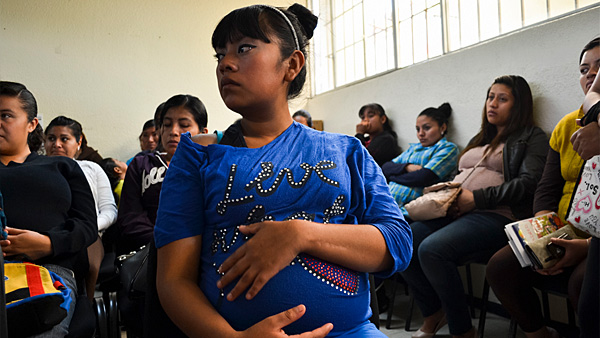| As Mexico's Teen Fertility Rate Rises, Activists Urge More Education & Contraceptives Mayela Sanchez - Global Press Institute | |
| go to original October 1, 2014 |
|

Fabiola Álvarez Hernández, 19, and her 22-year-old boyfriend knew about contraceptive methods but did not use them regularly. “At first, I did take the morning-after pills,” she says. “But after I did not want to, I said: ‘What if it hurts me?’ And I did not take them anymore.” She used emergency contraception three times. She learned about that method from her cousins and friends, not a doctor. (Mayela Sánchez/GPJ, Mexico)
Aiming to reduce unplanned teen pregnancies, the Mexican government has promoted prevention for three years. But critics says its campaigns target teenagers who can control their sex lives without taking into account how marginalization, gender violence, and access to sex education and contraception affect other teens. Although the government has also implemented actions to guarantee teenagers access to contraception, reproductive rights activists say access will not reduce the pregnancy rate unless programs ensure that teens obtain contraceptives and learn to use them effectively. Furthermore, sex education should go beyond providing information and promote sexual and reproductive rights, activists say.
Although the country’s overall fertility rate fell between 1999 and 2013, the fertility rate among 15- to 19-year-olds increased from 64 to 66 births per every 1,000 teens, according to the National Institute of Geography and Statistics.
More than 40 percent of pregnancies among 15- to 19-year-olds are not planned or desired, according to the National Population Council.
The Mexican government has focused on teenage sexual and reproductive health only in the past few years, according to the council. In 2011 and 2013, the council and the Ministry of Health launched campaigns aimed at helping 15- to 19-year-olds avoid unplanned pregnancies and sexually transmitted diseases.
The campaigns strive to empower teenagers to assume responsibility for sexual decisions, says Rufino Luna Gordillo, deputy director general of sexual and reproductive health for the National Center of Gender Equity and Reproductive Health, which is under the Ministry of Health.
Read the rest at Global Press Institute
We invite you to add your charity or supporting organizations' news stories and coming events to PVAngels so we can share them with the world. Do it now!
Celebrate a Healthy Lifestyle
 From activities like hiking, swimming, bike riding and yoga, to restaurants offering healthy menus, Vallarta-Nayarit is the ideal place to continue - or start - your healthy lifestyle routine.
From activities like hiking, swimming, bike riding and yoga, to restaurants offering healthy menus, Vallarta-Nayarit is the ideal place to continue - or start - your healthy lifestyle routine.